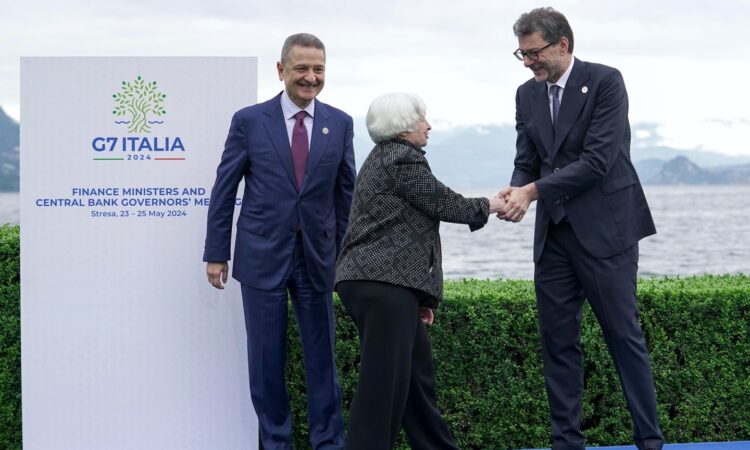
Meeting in northern Italy this week, the top financial officials of the Group of Seven nations agreed in a joint statement to tap the investment returns of “immobilized Russian sovereign assets” to support Ukraine. The Kremlin has been blocked from accessing hundreds of billions of dollars held in Western financial institutions after invading Ukraine in 2022, and European and U.S. officials have for months debated whether or how to unlock these funds to help fight off the invasion.
Russia has roughly $280 billion in sovereign assets stashed in Western financial institutions, the majority of which is held by European firms. Those funds are now frozen under the U.S.-led sanctions effort.
GET CAUGHT UP
Summarized stories to quickly stay informed
Under the emerging plan, the Western allies would essentially use the interest and other investment returns accruing on these assets to pay themselves back for money they give to Ukraine in the near term. The exact amount of the money that could be raised this way could vary, depending on interest rates and other financial conditions, and finance leaders are working out a thicket of complicated legal and financial questions.
Western leaders believe the plan could yield as much as $50 billion in short-term or medium-term funding for Ukraine, although key details need to be worked out. President Biden and other heads of state will aim to ratify the plan during subsequent meetings of the G-7 in Italy this June. Congress last month approved $95 billion in foreign military aid after a months-long logjam caused by House Republicans, but Ukraine’s supporters are eyeing other funding streams to buttress Kyiv’s considerable long-term financial needs.
“We are making progress in our discussions on potential avenues to bring forward the extraordinary profits stemming from immobilized Russian sovereign assets to the benefit of Ukraine, consistent with international law and our respective legal systems,” the statement says.
Initially, Ukraine’s boosters called for confiscating and transferring the entire pool of Russian sovereign assets to Kyiv. That plan was scuttled, however, as Germany, France, and other U.S. allies had expressed unease about a plan that they feared could compromise the financial stability of the euro zone by leading investors to put their money elsewhere. The new plan would leave Russia’s underlying assets untouched. The European Union voted earlier this month as well to move forward with using the profits of the frozen Russian assets.
Russia has strongly condemned all attempts to confiscate or repurpose its financial assets as a violation of international law. President Vladimir Putin signed a decree on Thursday authorizing the confiscation of assets held by U.S. citizens and companies in Russia, in response to the West’s proposal.
“We can see they are being careful, they understand the potential danger of such decisions and the potential consequences for themselves which are inevitable. That is why they have gone for the smaller option,” Kremlin spokesman Dmitry Peskov told reporters earlier this week, according to Reuters. “But even the smaller option is to us nothing less than expropriation.”
But hundreds of U.S. and European firms have already pulled out of the country in response to Russia’s invasion of Ukraine and the sanctions imposed afterward. Of the more than 1,600 international firms operating in Russia before the invasion, roughly 400 remain, with only 30 U.S.-based firms still operating there, according to Jeffrey Sonnenfeld, a professor at the Yale School of Management. Sonnenfeld called the Kremlin’s threat “inconsequential.”
Treasury Secretary Janet L. Yellen has led U.S. efforts to persuade European allies to use the seized sovereign Russian assets in some way, pointing to Kyiv’s long-term funding needs and the hundreds of billions of dollars in estimated damages Moscow’s war has caused its neighbor. The funds could also help ensure Ukraine has access to Western support even if Biden loses the presidential election this November.
“This is an assured source of financing,” Yellen told reporters earlier in the week. “It’s important that Russia realize that we will not be deterred from supporting Ukraine for lack of resources.”






